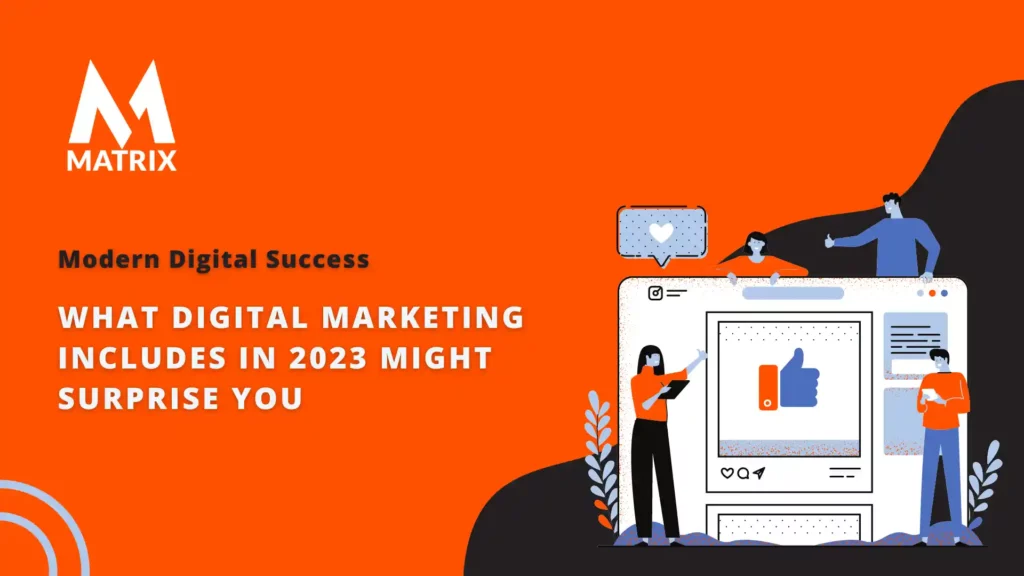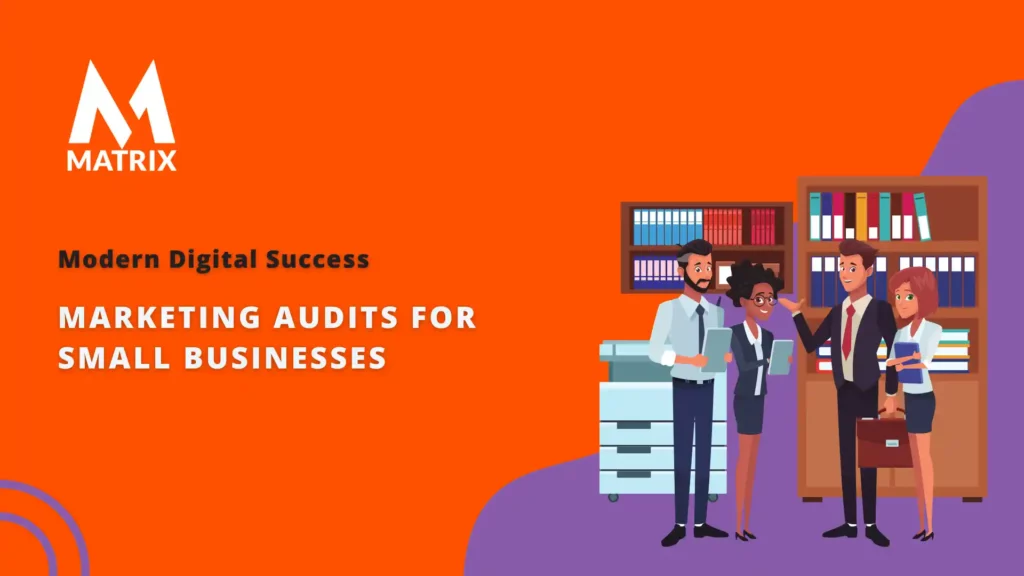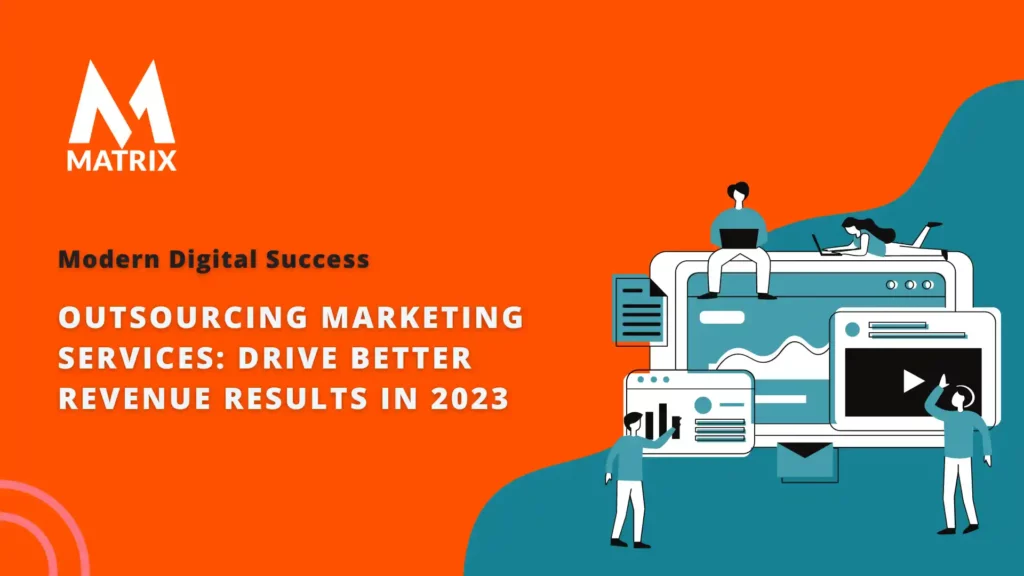What Digital Marketing Includes in 2023 Might Surprise You
Learn what digital marketing includes in 2023 and how to use them.
Digital marketing is essential to any successful business strategy in today’s digital world.
It encompasses various activities, including content creation and optimization, SEO, email campaigns, social media marketing, display advertising, inbound marketing, and more. All these activities are designed to help businesses reach their customers through the internet and other channels.
Digital marketing requires a holistic approach that should not be taken lightly. From the first website wireframe to the last word you wrote in a LinkedIn comment. Does it have intent and impact?
In this blog post, we will discuss each type of activity in detail and explain why companies should utilize digital marketing to reach their target audience and achieve success.
Are you looking for a way to reach your target audience and grow your business?
Digital marketing is the key to success in today’s digital world. It includes content creation and optimization, SEO, email campaigns, social media marketing, display advertising, inbound marketing, and more. These activities are designed to help businesses reach their customers through the internet and other channels.
With these tools at your disposal, you can easily create engaging content that appeals to your target audience while optimizing it for search engines so that it reaches even more people.
You can also use email campaigns or social media marketing strategies to engage with potential customers.
Finally, you can leverage display advertising or inbound marketing tactics to generate leads from interested prospects who have already expressed an interest in what you offer.
Learn more about how digital marketing can help grow your business by reading this blog post now!
Stats from 2022 about digital marketing results
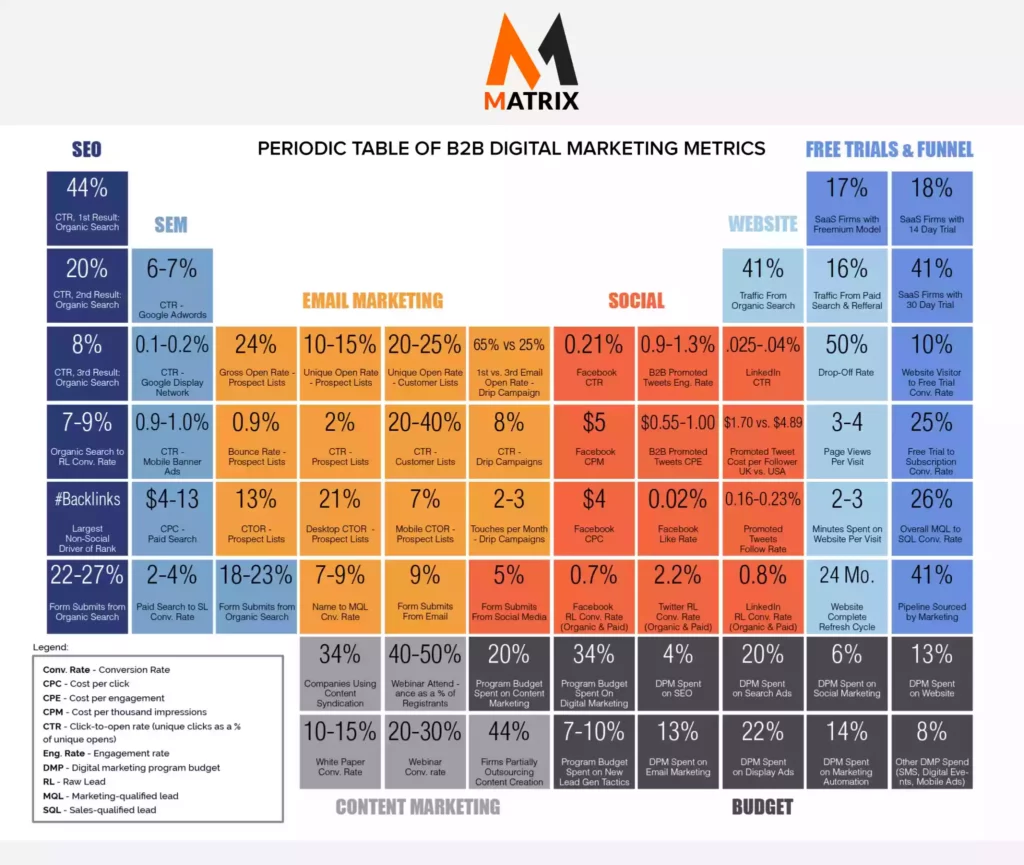
In 2022, companies that used digital marketing strategies for their businesses saw positive results and increased revenues. More than 80% of companies reported higher revenues from digital marketing than traditional marketing tactics, according to a survey conducted by the World Economic Forum.
Additionally, almost 90% of these companies reported a significant increase in customer engagement and satisfaction due to their digital marketing efforts.
The use of content creation and optimization was also found to be very effective in driving organic traffic and engaging customers with the brand. Content optimization for search engine visibility positively affected website traffic and business content engagement.
Companies that implemented SEO strategies into their online marketing plans saw an average 30 – 85% increase in organic web traffic.
Social media has also become essential to any successful digital marketing strategy. Companies that used social media experienced significant increases in customer engagement and conversions compared with those that did not utilize social media platforms like Facebook, Instagram, Twitter, or YouTube.
Furthermore, businesses that ran campaigns through social media channels had an average 25 – 40% conversion rate compared to those without social media campaigns.
Finally, email campaigns were found to be incredibly effective when used correctly. Companies that sent out emails regularly saw an average open rate of 21-30%, a 5-15% click-through rate, and an unsubscribe rate of 1-3%. This shows how powerful email campaigns can be when reaching customers and communicating with them directly.
Overall, digital marketing is vital to any successful business strategy in today’s modern age.
Companies are increasingly utilizing various digital marketing tactics such as content creation and optimization, SEO, email campaigns, social media marketing, display advertising, inbound marketing, and more to reach their target audience effectively and achieve success for their businesses.
The major challenge in marketing functions in leveraging digital marketing
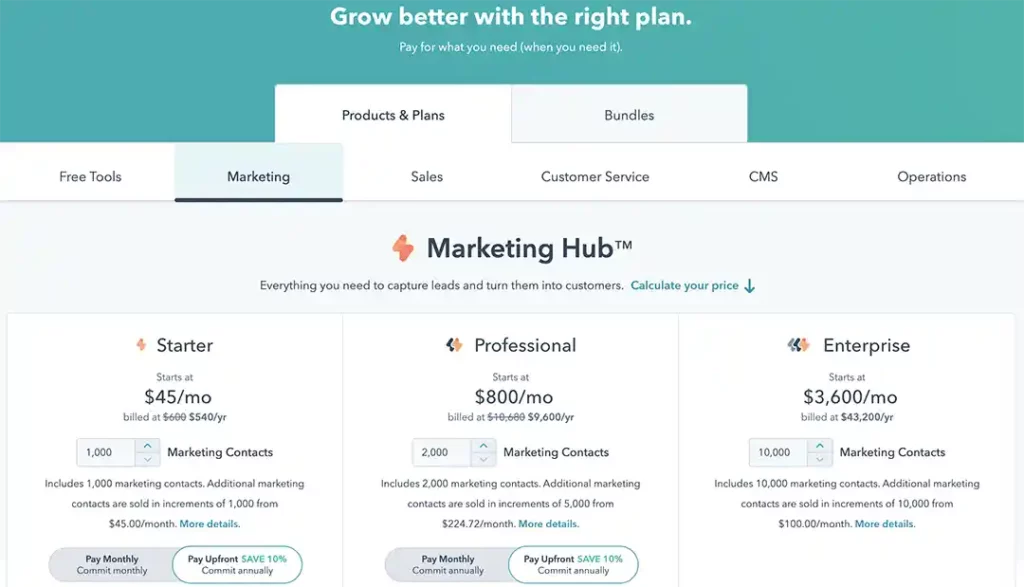
One of the major challenges in marketing leveraging digital marketing is understanding customer behavior and preferences. Digital marketing campaigns require a deep knowledge of customer behavior and preferences to be successful.
Companies must analyze customer data to understand their purchase intent, interests, and motivations. This can be a daunting task due to the sheer amount of data companies must collect and analyze to make informed decisions about their target audience.
Customer behaviors are ever-evolving with technology and trends making it difficult for companies to keep up with the changes. Companies must stay on top of current trends to ensure that their campaigns are targeted correctly and reach their target customers effectively.
Companies must be able to adjust quickly (agility) when customer behaviors change, or new technologies are introduced so that they can remain competitive and provide valuable experiences for their customers.
Another challenge facing marketers is managing budgets when implementing digital marketing strategies. Marketers must accurately understand how much money must be allocated towards each campaign or channel and predict ROI before investing resources into any strategy.
Calculating ROI accurately enables marketers to make better decisions when allocating resources across campaigns; however, this often requires detailed analytics that can prove difficult for smaller businesses without the right tools or expertise.
Finally, ensuring compliance with various regulations related to digital marketing can also be challenging.
Different countries have different laws regarding consumer protection which need to be adhered to by marketers to avoid penalties or, worse legal action being taken against them.
Keeping up with algorithm changes from search engines such as Google can prove difficult as these changes impact organic search visibility, which is a key component of the success of digital marketing strategy.
These are just some of the many challenges marketers face when utilizing digital marketing strategies and tactics.
However, if approached strategically, these challenges can be overcome through careful planning, detailed analysis and optimization efforts, budget management, and ensuring compliance with various regulations related to digital marketing practices.
By investing time into understanding each challenge thoroughly before implementation, companies will set themselves up for success in today’s highly competitive digital landscape.
Problems for CEOs in manufacturing about leveraging the new digital business models
The digital revolution has profoundly impacted businesses in the manufacturing industry.
As technology evolves, CEOs of manufacturing companies face growing pressure to adopt new digital business models to stay competitive. However, this shift has unique challenges that require careful consideration and planning.
Digital transformation is the CEO’s job. Only the CEO can make the fundamental changes required for a successful transformation.
That’s because a business model reinvention requires different organizational functions to work together in new ways. That can only happen by making large-scale investments and large-scale changes that start from the top down.
One of the biggest issues facing CEOs is data security. As companies move to the cloud, they are exposed to unprecedented levels of cyber risk. Without proper safeguards, sensitive customer information can be vulnerable to hackers or malicious actors.
To protect company data and reputation, CEOS must ensure their business model complies with industry regulations.
Another issue is the complexity of digital transformation. Although digital solutions offer tremendous opportunities for growth and efficiency, implementing them can often take time and effort for companies unfamiliar with the technology.
It’s important for CEOs to carefully assess their needs and create a strategy for digitalization that will work best for their organization before jumping into any major changes. This also requires understanding how different technologies work together and how they can be integrated into existing processes.
Finally, there is the question of cost-effectiveness when leveraging new digital models. While embracing these tools may provide certain advantages, manufacturers must also consider how much they are willing to invest in them while still staying within budget constraints.
Additionally, they must keep in mind potential hidden costs like maintenance fees or costly updates down the line, which could undermine any potential savings from automation in the long run.
As technology evolves at an ever-increasing rate, it’s becoming increasingly important for manufacturers to stay ahead of the curve while still controlling costs and protecting data security. CEOs have no choice but to take on this challenge head-on if they are going to succeed in today’s rapidly changing market environment. Digital marketing can be a key tool in helping them reach their goals and capitalize on the potential of modern digital solutions.
By understanding these challenges, CEOs will be better prepared to meet the demands of an ever-changing business landscape.
By carefully assessing their needs and creating a digital transformation strategy tailored to their organization’s needs, they can ensure they get the most out of any investment while staying compliant with industry regulations. This way, manufacturers can use digital marketing to succeed in today’s market.
With careful planning and strategic implementation, leveraging new digital models can increase efficiency and open up opportunities for growth and cost savings.
What is digital marketing strategy?
Digital marketing is a modern marketing method that utilizes digital channels and technologies to reach customers.
It includes content creation, SEO, email campaigns, social media marketing, display advertising, and inbound marketing.
Businesses can increase brand awareness and generate sales by utilizing these activities in tandem to reach a larger audience and engage customers.
What are the 12 types of digital marketing

Digital marketing has become essential to any successful business strategy in the modern world. There are not 4 types of digital marketing tactics; we should you 12 simple ones to begin immediately.
It encompasses various activities that help companies reach their target audience by utilizing the internet, social media, search engines, and other channels. There are twelve distinct types of digital marketing that businesses can employ to help them get their message out:
1. Content Creation and Optimization:
Creating content designed for your target audience is a great way to engage with them and build relationships. Optimizing your content for SEO will also help you rank higher in the search engine results pages (SERPs) so that more people can find it.
2. Search Engine Optimization (SEO):
SEO involves optimizing web pages to be more visible on the SERPs. This includes optimizing content, titles, meta descriptions, keywords, links, images, etc., and improving website loading speed and usability.
3. Email Marketing:
Utilizing email campaigns is an effective way to reach customers directly with special offers or new product releases. You can segment lists based on demographic or behavioral criteria to personalize campaigns and increase engagement rates.
4. Social Media Marketing:
Social media is one of the most powerful platforms for companies to connect with customers and build relationships with them over time.
This includes creating content tailored towards your target audience, sharing updates on new products or services, responding quickly to customer inquiries/complaints, running contests/promotions/ads, etc.
5. Display Advertising:
Display advertising involves placing graphical advertisements on web pages across various websites that may be relevant to your target audience’s interests or needs.
These ads usually contain text and visuals that draw attention and encourage people to click through for further information about a product or service the company behind the ad offers.
6. Video Advertising:
Video is rapidly becoming one of the most popular forms of online advertising due to its ability to capture attention quickly and effectively while providing a visually appealing experience for viewers simultaneously.
Companies can use videos within their websites or leverage YouTube or other video-sharing platforms as part of their marketing strategy.
7. Affiliate Marketing:
Affiliate marketing involves partnering up with other businesses to promote each other’s products or services in exchange for a commission when a sale is made from a referral link included in an affiliate’s website or blog post.
8 . Influencer Marketing:
Working with influencers who have established networks built around particular topics helps companies gain visibility quickly by tapping into these influencers’ followership base via sponsored posts and mentions on social media platforms such as Instagram and Twitter.
9 . Paid Search Advertising (PPC):
PPC campaigns involve paying for keyword-targeted ad placements on popular search engines like Google Ads so that when someone searches using those keywords, your ad appears prominently at the top of their results page before any organic listings do.
10 . Inbound Marketing:
Inbound marketing is just a cluster of digital marketing tactics. It’s used by inbound agencies, some HubSpot-centric trying to peddle HubSpot’s software. And there are a bunch of them.
Unlike traditional “outbound” marketing tactics such as cold calling or TV ads which actively try to bring customers TO you, “inbound” tactics focus on creating content that draws customers IN towards you organically via blogging articles/videos/podcasts/etc. Filling up lead magnets with valuable information (“opt-ins”), hosting webinars, write ebooks.
11 . Mobile Advertising:
As more people transition away from desktop usage towards mobile devices such as phones & tablets, mobile advertising has emerged as an effective way for companies to reach out & engage potential customers via apps & mobile-optimized websites.
12 . Voice Search Optimization:
With voice assistants like Siri & Alexa becoming increasingly popular, optimizing existing content & creating new content specifically designed for voice search queries is becoming crucial for companies looking to attract customers through this medium.
When and How to Use Different Types of Marketing?
Digital marketing is a powerful tool for businesses to reach their target audience and drive conversions. However, the success of any digital marketing strategy depends on understanding when and how to use the different types of marketing.
Content creation and optimization are essential components of any successful digital marketing campaign. Companies should create high-quality content, such as blog posts, videos, infographics, and more, tailored to their target audience’s needs and interests.
Businesses need to optimize their website for search engines by including relevant keywords to increase organic traffic from search engine results pages (SERPs). Companies should also focus on optimizing content for voice search queries to take advantage of rising trends in spoken language interactions between customers and digital devices like home assistants or smart speakers.
SEO strategies are also incredibly important for driving web traffic and increasing visibility within SERPs. Companies should focus on targeting specific keywords related to their products or services to generate leads from organic search results and rank higher than competitors. Companies should also create engaging titles and meta descriptions that will grab potential customers’ attention when they appear in SERPs.
Email campaigns are another great way for companies to connect directly with customers by sending personalized messages about special offers or new product releases. Companies should segment lists based on demographic or behavioral criteria to ensure that each customer receives an email tailored specifically toward them which can lead to increased engagement rates.
Social media is one of the most effective platforms for companies looking to build relationships with their customer base over time. This includes creating content tailored towards your target audience’s interests, sharing updates on new products or services, responding quickly to customer inquiries/complaints, running contests/promotions/ads, etc., all of which can lead to increased brand loyalty and customer retention rates over time.
Likewise, display advertising involves placing graphical advertisements across various websites that you think may be relevant to your target audience’s interests or needs. In contrast, video advertising captures attention quickly with visually appealing experiences and leveraging YouTube or other video-sharing platforms as part of an overall marketing strategy.
Mobile advertising has emerged as an effective way for companies to reach out & engage potential customers via apps & mobile-optimized websites.
Affiliate marketing involves partnering up with other businesses to promote each other’s products or services in exchange for a commission when a sale is made from a referral link included in an affiliate’s website or blog post. In contrast, influencer marketing works with influencers who have established networks built around particular topics, which helps companies gain visibility quickly by tapping into these influencers’ followership base via sponsored posts and mentions on social media platforms such as Instagram and Twitter.
Paid Search Advertising (PPC) campaigns involve paying for keyword-targeted ad placements on popular search engines like Google Ads so that when someone searches using those keywords, your ad appears prominently at the top of their results page before any organic listings do.
At the same time, inbound tactics focus on creating content that draws customers IN towards you organically via blogging articles/videos/podcasts/etc., filling up lead magnets with valuable information (“opt-ins”), hosting webinars, etc. At the same time, voice search optimization allows brands to capitalize on spoken language interactions between customers & digital devices through optimized existing content & new content specifically designed for voice search queries.
Overall, understanding when and how best to utilize different types of digital marketing will help companies develop successful strategies that will reach their desired audience while driving conversions at the same time. By taking advantage of these powerful tools available today, businesses can set themselves apart from the competition & reap significant rewards over time!
When can you expect to Start Seeing Results with Digital Marketing
Digital marketing generally comes over time with a strong focus on long-term strategies. While some campaigns may yield immediate results, companies should concentrate on building a solid foundation of content that drives organic traffic and leads over time. Patience and consistency is required. Over several months, companies can expect increased website traffic and conversions.
As part of long-term digital marketing strategies, companies should focus on creating quality content that resonates with their target audience. As this content is shared and interacted with more frequently, it will rank higher in search engine result pages (SERPs), resulting in more people being exposed to the company’s offerings. Additionally, by engaging customers through social media channels and responding quickly when they ask questions or offer feedback, businesses can create more meaningful connections with potential buyers, increasing brand loyalty and boosting sales.
Email campaigns are also an effective way to reach out directly to customers; measuring engagement rates among customers that receive emails helps identify what works best for the company’s strategy. Companies should also segment email lists based on customer demographics or behaviors to ensure each customer receives an email tailored specifically toward them which can lead to increased open rates and conversions. These strategies take time but eventually lead to better reach and engagement from potential buyers, driving qualified leads for the company’s products/services.
Lastly, paid search advertising (PPC) campaigns involve paying for keyword-targeted ad placements on popular search engines like Google Ads, which can generate quick results if done correctly.
Similarly, display advertising involves placing graphical advertisements across various websites relevant to the target audience’s interests or needs. In contrast, video advertising captures attention quickly with visually appealing experiences and leveraging YouTube or other video-sharing platforms as part of an overall marketing strategy.
Overall, investing in a quality digital marketing plan takes time and dedication but eventually yields rewards if done correctly – depending on the size of your business, you may start seeing results within 3 months after launching your campaign, but most likely, you’ll need 6-12 months before you start seeing returns on your investment. Companies should continuously track their progress throughout the process while remaining flexible enough to make adjustments to maximize their ROI over time!
Digital marketing examples for manufacturing firms

Digital marketing is essential for manufacturing firms to reach their target audience and drive growth.
Digital marketing provides manufacturers with various options to promote their products and services. Depending on the size of their business, they can expect to see results within 3 months.
Here are some digital marketing results examples that may be helpful for companies in the manufacturing industry.
Which manufacturing companies use HubSpot for digital marketing technology
Digital marketing technology has become an increasingly important part of any successful business strategy.
With the rise of digital platforms, it is even more important for companies to stay up-to-date with the changing landscape and leverage the latest technology to reach their target customers. HubSpot, one of the leading digital marketing platforms, is used by many manufacturing companies to help them effectively reach their goals.
Manufacturing companies often have extensive customer bases around the world and need to be able to communicate with them quickly and easily. This makes it easy for them to find new customers and keep existing ones engaged. HubSpot provides tools that allow manufacturers to create meaningful connections with their customers through email campaigns, content creation and optimization, SEO, social media marketing, display advertising, inbound marketing, and more.
Using HubSpot’s technology also gives manufacturers real-time insights into who their customers are and what they want. This can be incredibly useful in producing targeted campaigns tailored to each customer’s needs. Companies can use this data to create personalized experiences that result in higher engagement and ROI.
Additionally, HubSpot’s reporting capabilities make it easy for manufacturing companies to measure their progress over time. With granular data on performance metrics such as visits, leads generated, conversions made, revenue earned, etc., they can easily track their campaigns’ success. This helps them identify areas where they may need improvement or opportunities where they can capitalize on their existing successes.
Overall, HubSpot offers a comprehensive digital marketing platform for manufacturers that enables them to reach their target audience more quickly and effectively than ever before. It allows them to create personalized experiences for each customer while gathering valuable data about who they are dealing with and how best to engage them.
Its reporting capabilities provide valuable insights into campaign performance so that manufacturers can make well-informed decisions about how best to move forward with their marketing initiatives.
Manufacturing companies need help to keep up with the changing landscape of digital marketing. They need a reliable platform to help them reach their target customers and measure their success over time.
Imagine having access to an all-in-one digital marketing platform that gives you real-time insights into your customer base, allows you to create personalized experiences for each customer, and provides reporting capabilities so you can track progress.
HubSpot is the perfect solution for manufacturing companies looking to make the most of their digital marketing efforts. Its comprehensive suite of tools and features enables manufacturers to connect easily with their customers and maximize ROI from every campaign they run.
Conclusion
In conclusion, digital marketing technology is essential for any successful business strategy today. HubSpot provides a comprehensive platform that allows manufacturers to effectively reach their target customers and maximize ROI from every campaign they run. With its real-time insights into customer behavior, personalized experiences, and reporting capabilities, HubSpot is the perfect solution for manufacturing companies looking to stay ahead of the competition in this ever-changing landscape.
How Matrix Marketing Group can help with digital business strategy
Matrix Marketing Group provides a comprehensive suite of digital marketing services specifically tailored for manufacturers. The experienced team at Matrix deeply understands the manufacturing industry and its unique challenges in achieving success with digital marketing campaigns. By leveraging their expertise and the latest technology, they can help manufacturers reach their customers more effectively through various digital marketing channels.
Matrix’s services include SEO, content creation and optimization, email campaigns, social media marketing, display advertising, and inbound marketing strategy development. They work closely with each client to develop a comprehensive digital marketing strategy tailored to their needs. With Matrix’s help, manufacturing companies can reach the right audience.
General FAQs
What is digital business strategy?
Digital business strategy is a set of strategies and tactics businesses use to reach their target customers through digital channels, such as the internet, search engines, mobile devices, social media platforms, and other online sources.
How can Matrix Marketing Group help with digital business strategies?
Matrix Marketing Group provides a comprehensive suite of digital marketing services specifically tailored for manufacturers. Their experienced team deeply understands the manufacturing industry and its unique challenges in achieving success with digital marketing campaigns. By leveraging their expertise and the latest technology, they can help manufacturers reach their customers more effectively through various digital marketing channels.
Is HubSpot suitable for companies in the manufacturing industry?
Yes, HubSpot is suitable for companies in the manufacturing industry. It provides a comprehensive platform that allows manufacturers to effectively reach their target customers and maximize ROI from every campaign they run. With its real-time insights into customer behavior, personalized experiences, and reporting capabilities, HubSpot is the perfect solution for manufacturing companies looking to stay ahead of the competition in this ever-changing landscape.
What are the benefits of implementing a digital marketing strategy?
The benefits of implementing a digital marketing strategy include increased visibility and reach, improved customer engagement, and enhanced ROI. By leveraging the latest technology, businesses can effectively target potential customers and generate leads faster than ever. By utilizing digital media channels such as search engine optimization (SEO), content creation, email campaigns, display advertising, inbound marketing strategies, and social media platforms, businesses can dramatically increase the number of conversions at a lower cost per acquisition.
What types of services does Matrix Marketing Group offer to manufacturers?
Matrix Marketing Group offers a comprehensive suite of digital marketing services specifically tailored for manufacturers, including SEO, content creation and optimization, email campaigns, social media marketing, display advertising, and inbound marketing strategy development. Their experienced team deeply understands the manufacturing industry and its unique challenges in achieving success with digital marketing campaigns. By leveraging their expertise and the latest technology, they can help manufacturers reach their customers more effectively through various digital marketing channels.

